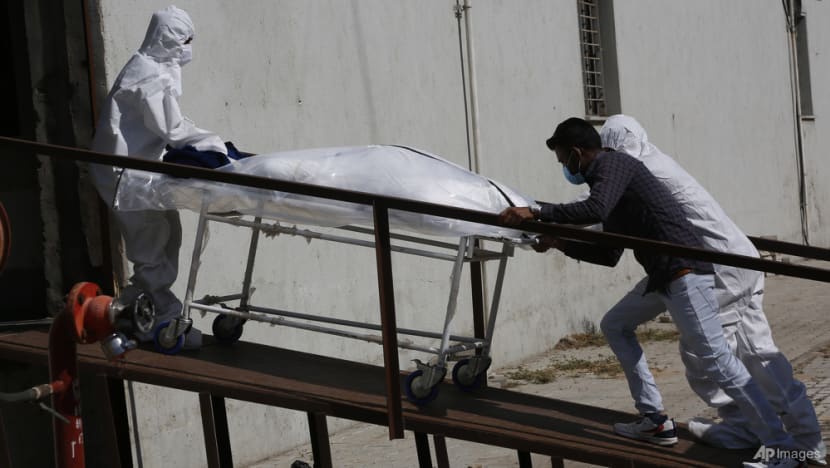Commentary: The worst harm that anti-vaxxers do is to their families
An estimated 163,000 COVID-19 deaths in the US alone could have been prevented by vaccination between June and November 2021, says the Financial Times' Simon Kuper.

LONDON: There’s a 13-year-old boy whose anti-vax father — an intelligent, accomplished man in his early 50s — died last month of COVID-19.
Go to the father’s Twitter feed and it’s the usual story: He warns followers that governments have “radicalised”, that Pfizer jabs are perilous and long COVID-19 is an invention, then tweets casually that he has tested positive, before his feed suddenly goes silent - forever.
Many vaccinated people enjoy mocking deaths like his. That’s harsh. We all make wrong choices every day, but they don’t usually kill us. Above all, though, vaxenfreude, as it’s now called, ignores the people left behind.
The worst harm that anti-vaxxers do is to their families, whom they expose to daily danger and then sometimes plunge into a grief that cannot speak its name.
The harm will reverberate down the generations. How will it shape the millions of bereaved and their relationship to the rest of us?
LIFE AND DEATH
Anti-vaxxers will tend to blame the victim’s supposed physical weakness or pretend that the death wasn’t from COVID-19,
For most inhabitants of rich countries, COVID-19 is no longer lethal, but for the voluntarily unvaccinated, it’s a slaughter they don’t understand
Their risk of COVID-19-related death is 14 times that of vaccinated people, says Rochelle Walensky, director of the US Centers for Disease Control.
Just between June and November, 163,000 COVID-19 deaths in the US alone could have been prevented by vaccination, estimates the Kaiser Family Foundation.
That’s nearly double all the American deaths in war in Korea, Vietnam, Afghanistan and Iraq combined — and the unvaccinated continue to die, pointlessly.
For each unvaccinated American death, about nine people lose a grandparent, parent, sibling, spouse or child. Probably the most distressing thing about COVID-19 is its relentless orphaning, which recalls the HIV epidemic in Africa or the Great Flu of 1918.
Think of the children of Kevin and Misty Mitchem, a couple in their forties who chose not to be vaccinated and who died of COVID-19 within days of each other in October.
Losing a parent young is one of the great life traumas. Bereaved children are often cast into depression (which is why my own chief life goal is to plug on until my kids are at least 18).
Yet when the parent is an anti-vaxxer taken by COVID-19, the child may feel shamed into silence over an unnecessary death that some people will always regard as farcical.
Meanwhile, anti-vaxxers will tend to blame the victim’s supposed physical weakness or pretend that the death wasn’t from COVID-19.
They can’t easily change their mind about the disease, because that would mean giving up their anti-vax identity and the community that comes with it.
DISENFRANCHISED GRIEF
Then there are people who won’t discuss the cause of death for fear of politicising a tragedy. (A new trend in parts of the US is to keep COVID-19 out of the obituary.) So children may not have anyone to talk to about the worst moment of their lives.
This is known as “disenfranchised grief” — a term coined by the psychologist Kenneth Doka to describe the feelings of mourners who cannot discuss their loss because the cause of death is stigmatised.
This was common during the AIDS epidemic and still is when somebody dies by suicide or an overdose or fighting on the unpopular side of a war. A friend of mine suffered disenfranchised grief when his former mistress died, and he couldn’t tell the person he loved most, his wife.
Today, the anti-vaxxer's bereaved relatives — who may themselves be vaccinated, or conflicted doubters — sometimes feel angry with the dead person, and/or with the society that mocks their pain.
Survivors can be saddled with lifelong guilt, especially if the death occurred after a large unvaccinated family gathering. And the death often worsens tensions in families already riven between the unvaccinated and vaccinated.
Almost the first thing the bereaved may have to decide together is whether masks must be worn at the funeral.
By rejecting modern medicine, anti-vaxxers have recreated past eras when people died like flies. Both my grandmothers, for instance, lost their fathers as teenagers, and each went on to lose a child.
That was normal a century ago. It was also unbearable, especially because there was almost no language to talk about grief then.
For all the angst today about the horrors of social media, that generation was probably more damaged than ours. And the damage was bequeathed to their descendants: Both my parents were shaped by their mothers’ unhappiness, and so those long-ago deaths shaped me, too.
Imagine the fear, stress and confusion of a child being raised by anti-vaxxers now. The virus is everywhere like never before and is slaying people around you.
It would be natural to start wondering whether the rest of the world is right and mummy and daddy have joined a death cult. It’s an experience that may set these children apart into the 22nd century.





















